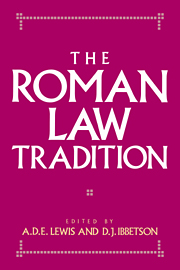Book contents
- Frontmatter
- Contents
- List of contributors
- Foreword: Peter Stein, Regius Professor of Civil Law in the University of Cambridge, 1968–1993
- List of abbreviations
- 1 The Roman law tradition
- 2 Labeo and the fraudulent slave
- 3 Doing and causing to be done
- 4 The danger of definition: contrectatio and appropriation
- 5 Going to the fair – Jacques de Révigny on possession
- 6 Bembo giureconsulto?
- 7 Gentilis and the interpretatio duplex
- 8 Ius gentium in the practice of the Court of Admiralty around 1600
- 9 Stair's title ‘Of Liberty and Servitude’
- 10 The actio communi dividundo in Roman and Scots law
- 11 Sale and transfer of title in Roman and Scots law
- 12 ‘What Marcellus says is against you’: Roman law and Common law
- 13 Audi et alteram partem: a limit to judicial activity
- Index of sources
- Index of names and subjects
Foreword: Peter Stein, Regius Professor of Civil Law in the University of Cambridge, 1968–1993
Published online by Cambridge University Press: 08 October 2009
- Frontmatter
- Contents
- List of contributors
- Foreword: Peter Stein, Regius Professor of Civil Law in the University of Cambridge, 1968–1993
- List of abbreviations
- 1 The Roman law tradition
- 2 Labeo and the fraudulent slave
- 3 Doing and causing to be done
- 4 The danger of definition: contrectatio and appropriation
- 5 Going to the fair – Jacques de Révigny on possession
- 6 Bembo giureconsulto?
- 7 Gentilis and the interpretatio duplex
- 8 Ius gentium in the practice of the Court of Admiralty around 1600
- 9 Stair's title ‘Of Liberty and Servitude’
- 10 The actio communi dividundo in Roman and Scots law
- 11 Sale and transfer of title in Roman and Scots law
- 12 ‘What Marcellus says is against you’: Roman law and Common law
- 13 Audi et alteram partem: a limit to judicial activity
- Index of sources
- Index of names and subjects
Summary
Bracton got his Roman law from the Glossators, Hale from the Humanists and Austin from the Pandectists. In each case the English writer was affected by the form and tendency of his source. Bracton found a legal grammar with which he was able to build up a picture of English law in substantive rather than procedural terms. Hale found an account of the parallel development of law and society from a primitive to a sophisticated system. Austin found the categories and tools of analysis with which to test the scientific quality of the law against an external standard.
This passage from his inaugural lecture as Regius Professor of Civil Law in Cambridge, Roman Law and English Jurisprudence Yesterday and Today (Cambridge, 1969), witnesses to the depth and range of Peter Stein's scholarship. He has made major contributions to jurisprudence and its history, and he is a master of the western European legal tradition and its Roman foundation.
His writings have ranged across the whole field of the Roman legal tradition: the substantive Roman law and its reflection in modern legal systems, both Common law and civilian, from Scotland to San Marino; the resurgence of Roman law in the twelfth and thirteenth centuries, and legal humanism in the sixteenth; the basic forms of legal reasoning and modes of legal analysis; Roman legal ideas and their pervasive influence on political philosophy.
- Type
- Chapter
- Information
- The Roman Law Tradition , pp. xiPublisher: Cambridge University PressPrint publication year: 1994

